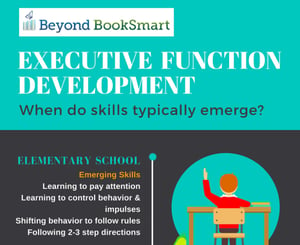Content updated on April 17, 2025.
Parents often ask us about their children’s Executive Function development. Is my child on track with her peers? Is it unusual that a 4th grader has a poor sense of time? Will my son manage his emotions better by the time he gets to high school?
Is it unusual that a 4th grader has a poor sense of time? Will my son manage his emotions better by the time he gets to high school?
The short answer is that each child develops Executive Function skills (EF skills) on his or her own timeline throughout childhood, adolescence, and young adulthood. The more nuanced answer is that there are several factors that influence a child’s Executive Function development. For our purposes, we can divide them into internal (within the child) and external (in the child’s environment) factors, to give you a better sense of how complex this topic can be.
When Does Executive Functioning Develop?
This is a complicated question to answer as Executive Function is an umbrella term for a number of important skills. However, the foundations of Executive Function skills have been observed to begin in infancy and ramp up development around the ages of 3-5. Executive Function development continues into adolescence and beyond for healthy individuals.
Certain EF skills may be developed at an early age, but improved upon for decades. For example, cognitive flexibility skills have been shown to peak from the ages of 20-29 (Zelazo, et al, 2014). It’s important to note that these skills can vary from person to person and there are many evidence-based methods to improve them.
Internal Factors that Impact Executive Function Development
Internal factors that can affect the development of a child's Executive Function skills include intellectual disabilities, struggles with physical or mental health, or learning differences such as ADHD (a common diagnosis in the students we coach). Recent research suggests that the brains of children with ADHD may mature about three years behind their typical peers (Shaw, et al, 2007). Although there are no differences in how their brains mature; it’s more a matter of when. So, you can see why it’s not surprising to us when we see a bright 13 year old with ADHD who has a lot of trouble planning and prioritizing.
Environmental Factors that Affect Executive Function Development
Environmental factors that can influence a child’s Executive Function development include economic hardship, abusive or neglectful caregivers, violence in the home or community, chaotic surroundings, and poor access to nutritious food. Harvard’s Center for the Developing Child notes that toxic stress from environmental factors can actually alter a child’s brain and disrupt normal development of Executive Functioning.
Building a Foundation for Executive Function Development
It’s helpful to think about the foundation that Executive Function skills are built upon: adequate sleep, good nutrition, safe surroundings, and a pain-free body. If any of these foundation elements are missing, a child’s higher level cognitive skills can be at risk. Have you ever tried to lead a presentation at work on 2 hours of sleep? Or pay bills with a raging migraine? Or maybe plan all the details of a family vacation when your stomach is rumbling with hunger? When a child’s foundation is shaky in any of these areas, the first priority is shoring up and stabilizing themselves before any substantive progress on skills -- such as impulse control -- can occur.
How to Develop Executive Functioning Skills in Children
If it seems to you that making steady Executive Function progress hinges upon a host of both internal and external influences, you’re correct. But the good news is that parents, caregivers, and educators can take specific steps to foster growth of these skills in all children.
Some methods to develop executive functioning skills include setting a stable schedule for schoolwork and chores, encouraging achievements with rewards, teaching children to use tools like planners and calendars, building systems like checklists, and creating a healthy environment to foster learning and focus.
If you find that your child is lacking in EF skills there are resources to help. Our expert Executive Function coaches provide students with the tools and systems they need to excel in school and throughout their lives. Learn more about Executive Function coaching and how we can help bring out the best in your child.
According to Harvard University’s Center for the Developing Child, “Adults can facilitate the development of a child’s executive function skills by establishing routines, modeling social behavior, and creating and maintaining supportive, reliable relationships. It is also important for children to exercise their developing skills through activities that foster creative play and social connection, teach them how to cope with stress, involve vigorous exercise, and over time, provide opportunities for directing their own actions with decreasing adult supervision.”
Executive Function Skills Are Developed Over Time
Perhaps the most important environmental factor in Executive Function growth is the fact that children learn these skills through experience, cumulatively, over time. Some children can learn skills such as time management by trial and error. When they have a bad outcome, they recalibrate and change their approach. Many others learn best when given explicit strategies to gain awareness of time and to stay on schedule. Either way, if children are not given opportunities to practice and use skills such as organization and planning, we can’t expect them to be independent planners and organizers when they reach young adulthood.
There’s Still Time to Develop Executive Function Skills
If your child is struggling with time management, focus, prioritization of tasks, forgetfulness, or social skills change is possible. There are a number of methods that can improve your child’s EF skills at school and at home.
Executive function coaching can increase your child’s academic performance and their motivation to learn. Our compassionate coaches meet with your child weekly to deeply understand their needs and goals and make a plan for success. Reach out to us today so we can set up a custom EF coaching plan for your child.
Sources:
- Shaw, P., Eckstrand, K., Sharp, W., Blumenthal, J., Lerch, J.P., Greenstein, D., Clasen, L., Evans, A., Giedd, J. & Rappaport, J.L. (2007). Attention-deficit/hyperactivity disorder is characterized by a delay in cortical maturation. Proc. Natl. Acad. Sci, 104:19649-19654.
- Center on the Developing Child, Harvard University
- Zelazo, P. D., Anderson, J., Richler, J., Wallner-Allen, K., Beaumont, J., Conway, K., Gershon, R., & Weintraub, S. (2014). NIH Toolbox Cognition Battery (CB): Validation of Executive Function Measures in Adults. Journal of International Neuropsych. Society, 6:620-629.
- photo credit: Happy Girl Hopscotch in Strawberry Free Creative Commons via photopin (license)

Download our infographic, featuring a timeline of typical Executive Function development.

